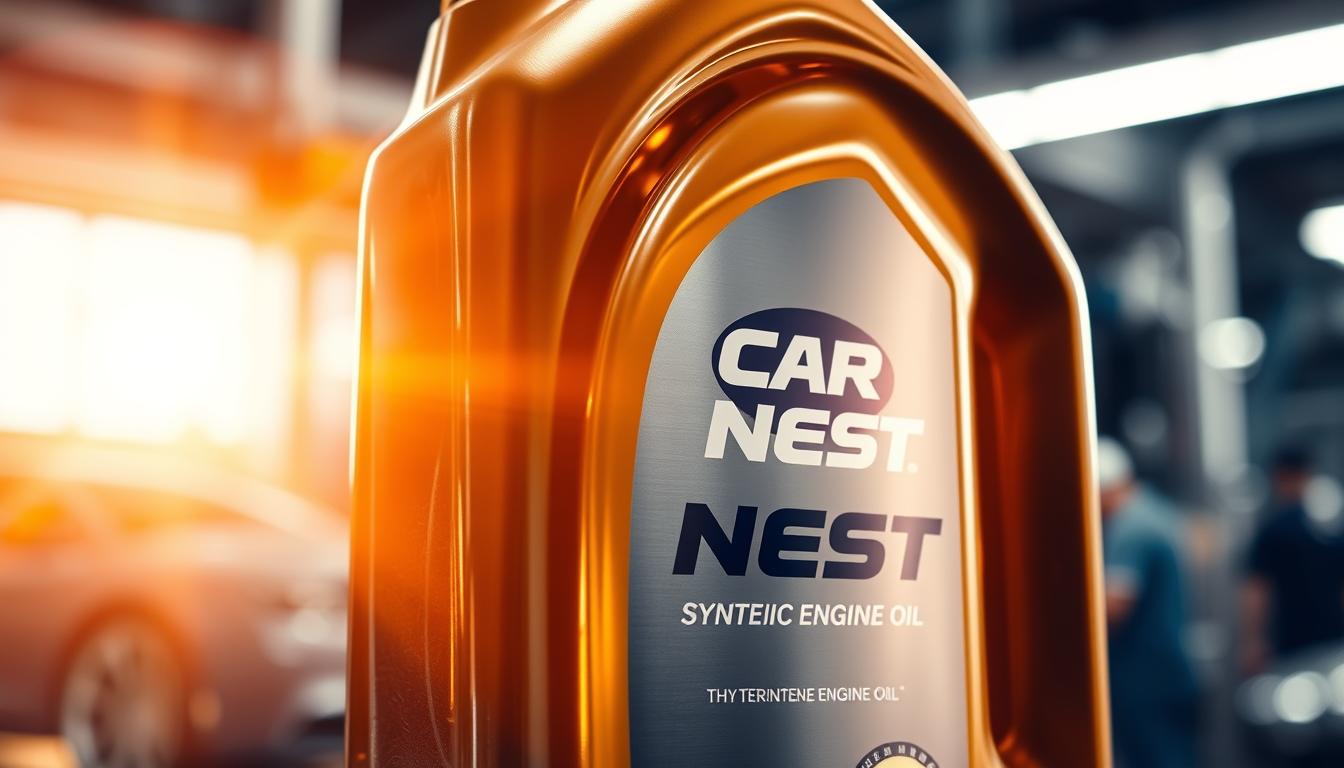Nearly 70% of new cars in recent model years are using either fully synthetic or synthetic blend oils, a significant shift from traditional conventional oil. This trend isn’t just a fad; it’s driven by the superior performance and protection that synthetic engine oil offers to modern car engines.
So, what makes synthetic oil so special? At the molecular level, it’s engineered to have uniform molecules, unlike conventional oil, which has varied molecular structures. This difference gives synthetic oil a edge in providing better engine protection across a wide range of driving conditions.
For personalized advice on choosing the best oil for your car, you can reach out to us via WhatsApp at +44-7822010953.
Key Takeaways
- Synthetic engine oil provides superior performance and protection for modern car engines.
- The molecular structure of synthetic oil is uniform, unlike conventional oil.
- Nearly 70% of new cars use synthetic or synthetic blend oils.
- Synthetic oil offers better engine protection across various driving conditions.
- Personalized advice on synthetic oil options is available via WhatsApp.
Understanding Synthetic Engine Oil
To understand the benefits of synthetic engine oil, it’s essential to delve into its composition and manufacturing process. Synthetic oil used in motor vehicles is refined from base oils or base stock oils. The American Petroleum Institute (API) categorizes base oils into five categories; the first three are oils refined from petroleum crude oil.
The Science Behind Synthetic Oil Formulation
Synthetic oil formulation involves creating uniform molecular structures that provide predictable performance characteristics across a wide range of operating conditions. Unlike conventional oil, which is refined from crude oil, synthetic oil is engineered molecule by molecule. This process allows for the creation of a lubricant with consistent properties, tailored to the demands of modern engines.
The API classification system for base oils is crucial in understanding synthetic oil. Group IV base oils are fully synthetic, and Group V contains all base oils not in the first four groups. The uniform molecular structure of synthetic base oils contributes to their superior performance in modern engines, especially under extreme conditions.
Different Types of Synthetic Base Oils
The two most common base oils used for synthetic oil are Polyalphaolefins (PAOs) and Esters (Diester and Polyol). Let’s explore these in more detail.
Polyalphaolefins (PAOs)
PAOs are the most common type of synthetic base oils used today. They are Group IV base oils and offer several benefits, including improved oxidation and thermal stability, low volatility, good heat dissipation, and a low pour point. PAOs are similar to mineral oil in their chemical makeup but are purer due to their synthetic production process.
Esters and Other Synthetic Bases
Ester-based synthetic oils, including Diesters and Polyol esters, offer unique properties such as exceptional thermal stability and excellent low pour point characteristics. These properties make them suitable for high-performance applications and extreme operating conditions.
Understanding the different types of synthetic base oils and their properties is crucial in appreciating the benefits of synthetic engine oil. By combining the right base oils with additives, synthetic oil provides superior engine protection and performance.
The Benefits of Using Synthetic Engine Oil
When it comes to engine care, synthetic oil stands out for its superior qualities compared to conventional oils. Synthetic engine oil is designed to provide enhanced performance and protection for engines under various operating conditions. The benefits of using synthetic engine oil are multifaceted, ranging from improved viscosity index to extended oil change intervals.
Superior Performance in Extreme Temperatures
Synthetic oils maintain optimal viscosity across a wide temperature range, ensuring superior engine protection during cold starts and high-temperature operations. At low temperatures, synthetic oils remain fluid, allowing for immediate engine lubrication when conventional oils might be too thick to circulate effectively. For instance, synthetic oils can remain fluid at temperatures as low as -40°F, providing instant protection.
Enhanced Engine Protection Against Wear
The uniform molecular structure of synthetic oils creates a stronger protective film between moving engine parts, significantly reducing friction and wear. This enhanced protection is crucial during cold starts when up to 75% of engine wear typically occurs.
Reduced Sludge and Deposit Formation
Synthetic oils have superior cleaning properties and resistance to oxidation, preventing the formation of sludge and deposits that can restrict oil flow and reduce engine efficiency. By keeping the engine cleaner, synthetic oils help maintain its performance and longevity.
Extended Oil Change Intervals
One of the significant advantages of synthetic oil is its longer lifespan compared to conventional oil. The recommended oil change interval for synthetic oil is around every 5,000 to 7,000 miles, with some formulations allowing for intervals as long as 15,000 to 25,000 miles. For more information on the differences between synthetic and conventional oil, you can visit this resource.
| Characteristics | Synthetic Oil | Conventional Oil |
|---|---|---|
| Viscosity Index | Higher, more stable viscosity across temperatures | Lower, less stable viscosity across temperatures |
| Low-Temperature Performance | Remains fluid at very low temperatures (-40°F) | Becomes thick and less effective at low temperatures |
| Oil Change Intervals | 5,000 to 7,000 miles or more (up to 25,000 miles) | Typically every 3,000 to 5,000 miles |

In conclusion, synthetic engine oil offers numerous benefits, including superior performance in extreme temperatures, enhanced engine protection, reduced sludge formation, and extended oil change intervals. For drivers looking to maximize their engine’s longevity and performance, synthetic oil is a worthwhile consideration. You can also explore more car maintenance tips on this page.
Synthetic vs. Conventional Oil: What You Need to Know
When it comes to choosing the right oil for your car engine, understanding the differences between synthetic and conventional oil is crucial. Both types of oil have their own set of advantages and disadvantages, and making an informed decision can significantly impact your vehicle’s performance and longevity.
Chemical Structure and Stability Differences
The molecular structure of synthetic oil is more uniform than that of conventional oil, contributing to its superior stability and performance. Synthetic oils are formulated to have a more consistent viscosity, which improves their lubricating properties under various temperature conditions. In contrast, conventional oils have a more varied molecular structure, which can lead to breakdowns under high-stress conditions.

Performance Under High-Stress Conditions
Synthetic oils outperform conventional oils under high-stress conditions, such as extreme temperatures and heavy loads. According to a study by the American Automobile Association (AAA), synthetic oils outperformed conventional oils by an average of 47% in tests evaluating shear stability, deposit formation, volatility, and oxidation resistance. These performance advantages can lead to improved fuel economy and extended engine life.
- Better shear stability
- Reduced volatility
- Superior oxidation resistance
Is the Higher Cost of Synthetic Oil Worth It?
The cost of synthetic oil is significantly higher than that of conventional oil, with prices ranging from two to four times more. However, the extended change intervals of synthetic oils can offset their higher initial cost, potentially making them more economical over the long term. We need to weigh the benefits of synthetic oil against its higher cost to determine if it’s worth the investment for your specific driving needs.
As we’ve seen, synthetic oil offers several advantages over conventional oil, including improved performance and potentially longer engine life. While the higher cost of synthetic oil may be a deterrent for some, its benefits make it a worthwhile investment for many drivers.
When Synthetic Oil Makes the Most Sense
While conventional oil works for many cars, certain driving conditions and vehicle types benefit significantly from synthetic oil. Synthetic oil is designed to provide superior performance and protection in extreme conditions, making it an ideal choice for specific vehicle owners.
High-Performance and Modern Engines
High-performance and modern engines, especially those with turbochargers or direct injection systems, benefit greatly from synthetic oil. These engines have tighter tolerances and operate under higher stress, making the superior lubrication properties of synthetic oil crucial for maintaining engine health and performance.
Extreme Climate Conditions
Synthetic oil excels in extreme temperatures, whether it’s the cold of winter or the heat of summer. In cold climates, synthetic oil can handle temperatures as low as -40°C (-40°F) without losing its lubricating properties, ensuring easy starts and reduced engine wear. In hot conditions, it maintains its viscosity and protective qualities, safeguarding the engine from excessive wear.

Heavy-Duty Applications and Towing
For vehicles used in heavy-duty applications such as towing, hauling, or frequent stop-and-start driving, synthetic oil is essential. These conditions put additional stress on the engine, and synthetic oil’s enhanced lubricating properties help mitigate the increased wear and tear.
Maximizing Engine Longevity
Using synthetic oil can also contribute to maximizing engine longevity. Its superior protection against wear, sludge formation, and deposit buildup helps maintain the engine’s health over time. This is particularly beneficial for high-mileage engines or those driven under harsh conditions.
| Driving Condition | Benefit of Synthetic Oil |
|---|---|
| High-Performance Driving | Superior lubrication and engine protection |
| Extreme Temperatures | Maintains viscosity and protective qualities |
| Heavy-Duty Applications | Reduces wear and tear under high stress |
| Long-Term Engine Health | Protects against sludge and deposit formation |
Conclusion: Making the Smart Choice for Your Vehicle
As we’ve explored throughout this article, synthetic engine oil offers a multitude of benefits for vehicle owners. Its superior molecular structure provides better protection, performance, and longevity for virtually all engine types.
Even if your vehicle’s manual doesn’t specifically require synthetic oil, upgrading to a full synthetic formula can provide significant benefits for both modern and older engines. This is particularly true in scenarios where your vehicle is subjected to extreme temperatures, high-performance driving, or heavy-duty applications.
When selecting the right synthetic oil for your vehicle, it’s crucial to follow manufacturer recommendations for viscosity while considering an upgrade to synthetic formulations. Regular oil level checks and maintenance are also essential, regardless of the oil type used.
For personalized recommendations on the best synthetic oil options for your specific vehicle and driving conditions, feel free to contact us via WhatsApp at +44-7822010953. Making the smart choice for your vehicle involves understanding your specific needs and choosing the right oil to meet those needs.


